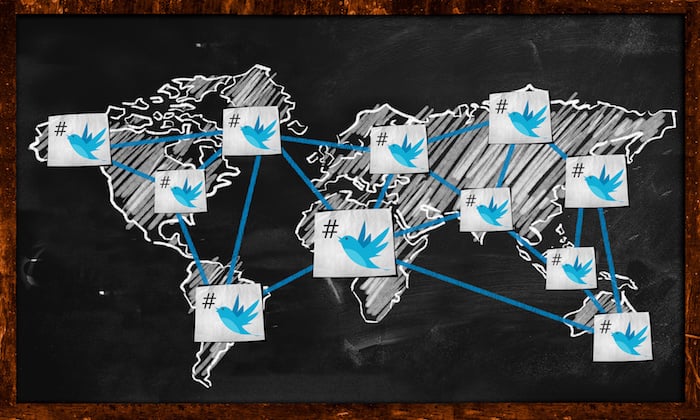
What if I told you that you could get 10,000 Twitter followers without having to follow others or spend a bunch of money on ads?
What if I also told you that it would be pretty easy to do?
Well, I’ve got seven simple, straightforward, and super effective Twitter tips to help you do just that.
Twitter is still among the top social networks today for users with over 192 million daily active users.
Twitter could be the secret ingredient to connecting with the biggest possible audience, and I am going to help you do it.
First, though, let’s talk about why you would even want more Twitter followers.
Why do Twitter Followers Matter?
Sure, Facebook is the biggest social network with the most monthly active users.
However, you shouldn’t underestimate Twitter’s importance.
It’s a global powerhouse.
Even though nearly a quarter of Americans use Twitter regularly, much of Twitter’s user base is international users.
This means that Twitter allows you to connect with a global audience.
There are other factors to consider, too.
Such as how Twitter’s millennial and Gen Z audience is a coveted one from a marketing perspective.
In fact, 42 percent of Twitter users are between the ages of 18 and 29, and 27 percent are between the ages of 30 and 49.
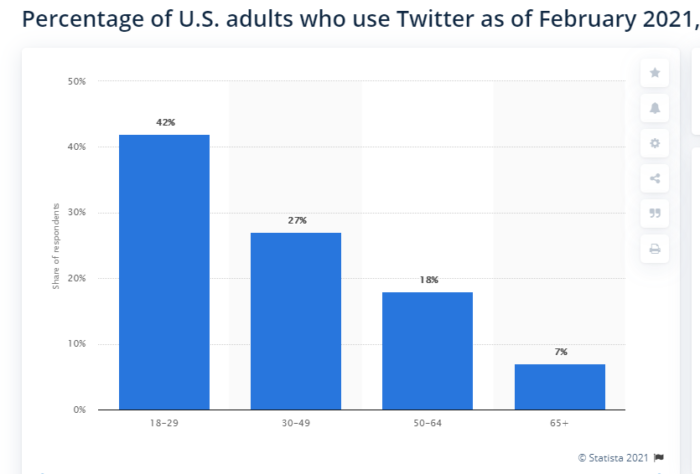
Not only are there tons of millennials on Twitter, millennials more frequently use social media as a tool for discovering new brands.
Statistically speaking, millennials and Gen Z are an ideal target demographic for many companies because they make up a huge market.
So why not reach out to them where they live?
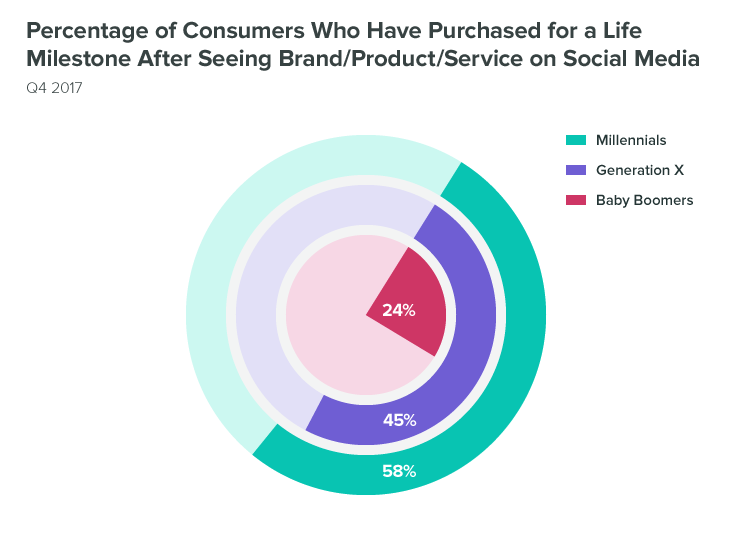
Millennials eat out more, love trying new products, and they’re always looking for unique experiences with brands and companies.
In fact, the rise of the millennial generation has forever changed the world of marketing, from the strong focus on video to the rise of influencer marketing, and the emphasis on emotional connection.
There’s another reason Twitter is so attractive to marketers, and that’s because it gives you 100 percent reach.
However, there’s a caveat.
When you post to Twitter, your tweets are only seen by your followers or when your tweets are shared with others’ Twitter followers.
You have 100 percent reach only with your followers and their followers.
This means 100 percent reach on Twitter doesn’t matter if there aren’t people seeing your content.
According to recent research, 74 percent of the people who follow small and medium businesses on Twitter are following these businesses because they want updates on future products.

Additionally, nearly half of those who follow brands and businesses are more likely to visit those companies’ websites.
So your Twitter followers will often become people who visit your website and invest in your brand through purchases.
Fortunately, I can help you get followers quickly and effectively.
How to Get Twitter Followers Fast
Now that you know why Twitter followers matter, let’s talk about how to get them. Keep in mind, quality is always better than quantity. 100K followers is great — but not if they don’t care about your business.
1. Optimize Your Twitter Profile to Attract Twitter Followers
For all the power you stand to gain by using Twitter for your business, not having a professional, up-to-date profile can be a major turn-off to prospective followers.
So one of the first steps on the road to amassing tons of followers is to make sure your Twitter profile rocks.
Your profile picture is the centerpiece of your Twitter profile.

It’s the part of your Twitter profile people probably notice and look at first.
Aside from your username, it’s the one profile element that doesn’t just appear on your profile. It’ll show next to your tweet in the other users’ feeds when you post.
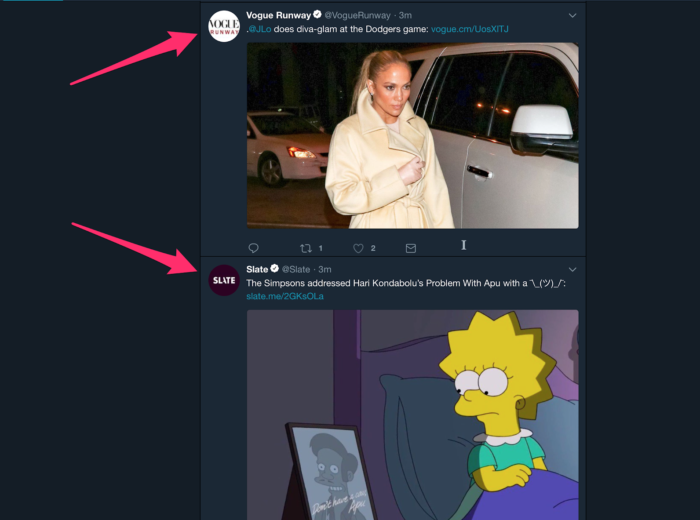
So, choose a photo that’s appropriate for your business or brand.
Whether you’re using a professional photo of yourself or your brand’s logo, you want to make sure that the most important elements appear toward the center of the image.
Due to the circular format, anything that appears toward the edges of your profile photo won’t show on your profile.
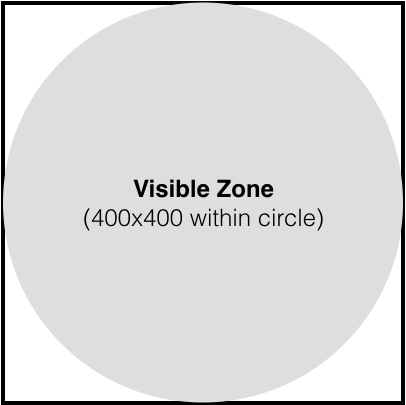
It’s even a good idea to resize your image. Although you can upload higher-res files, your profile image doesn’t need to be any bigger than a 400px by 400px square.
Here are some examples of how these profile image best practices can be implemented:
Bitfinex — a cryptocurrency exchange company — uses their logo for their profile image.
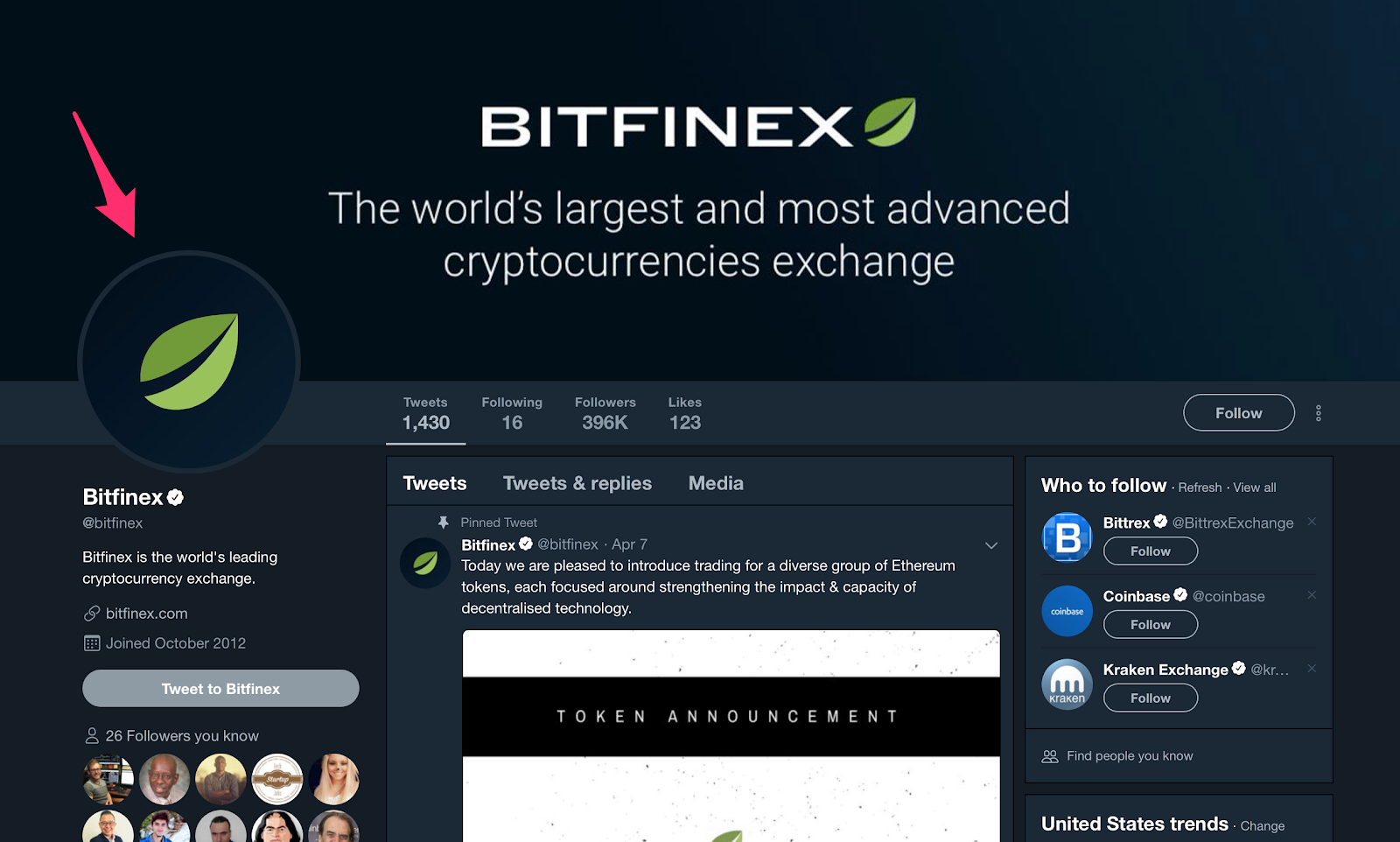
Similarly, you can see New York Magazine’s iconic logo as the profile pic used for their Twitter account.
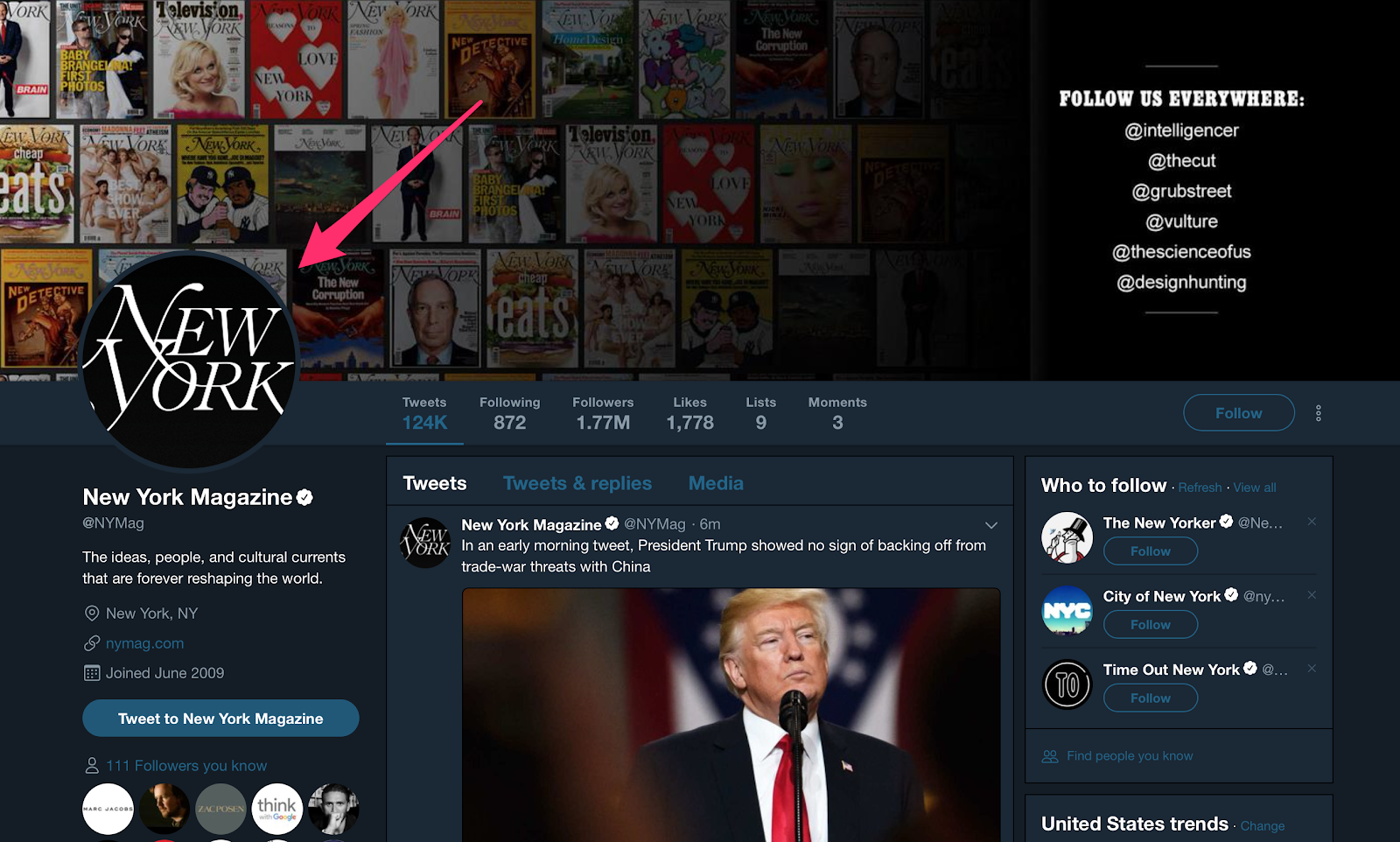
However, Virgin Group founder and colorful businessperson Richard Branson uses a photo of himself. The photo looks professional yet casual and relatable.
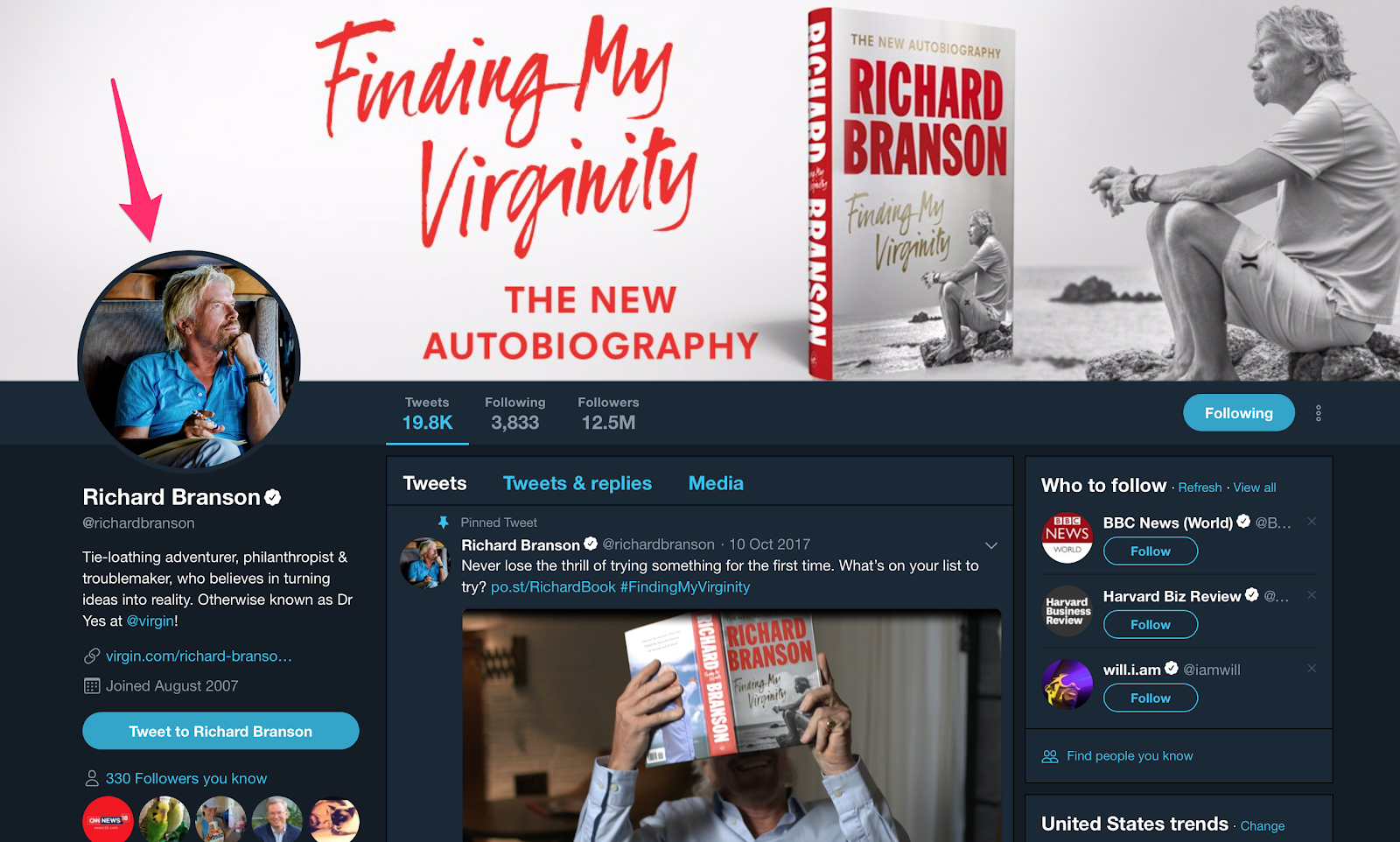
Not only is this smart for promotional purposes, but it also helps people make stronger associations between your brand and logo.
Your profile photo should draw attention because it will be the identity that your followers will come to see behind all the content you post on Twitter.
Using a branded logo as a profile image, like Louis Vuitton, is an easy and quick way to get followers to recognize your posts instantly.
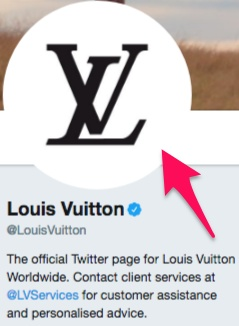
Beyond the profile photo, there’s the ‘Bio.’
This is the area of your Twitter profile where you provide a little — just 160 characters in total — information about your brand or business.
Here’s an example from the Washington Post’s Twitter profile:
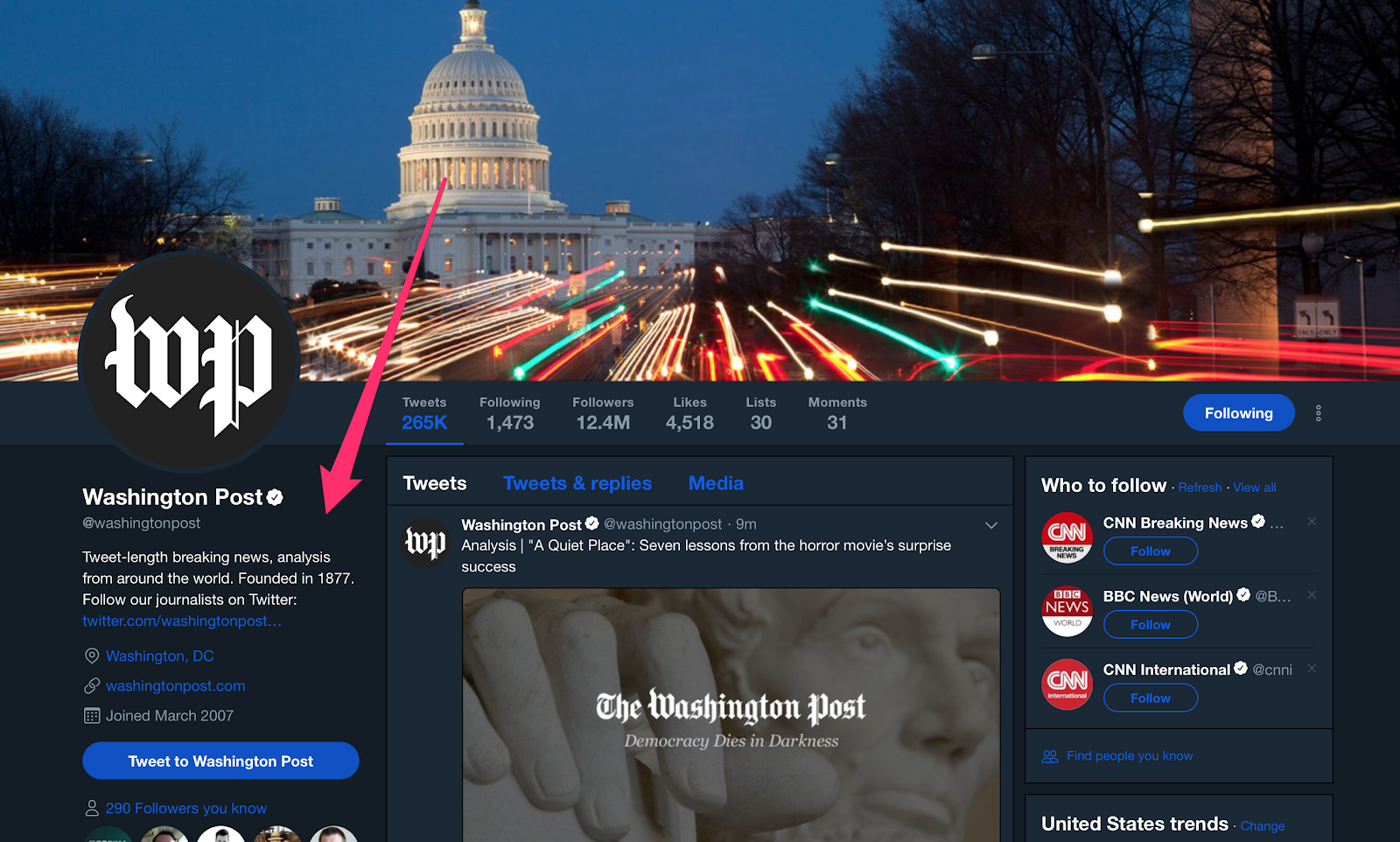
As you can see, the goal of your profile is to give a prospective follower an idea of (a) what your business is and (b) what they can expect by becoming a follower.
There’s another reason why your bio is important: it’s searchable.
Of course, you’ll want to include all the essential info, such as your website, location, and possibly a phone number.
You’ll want to include keywords that are relevant to your brand or company in your bio.
PlayStation does this well.
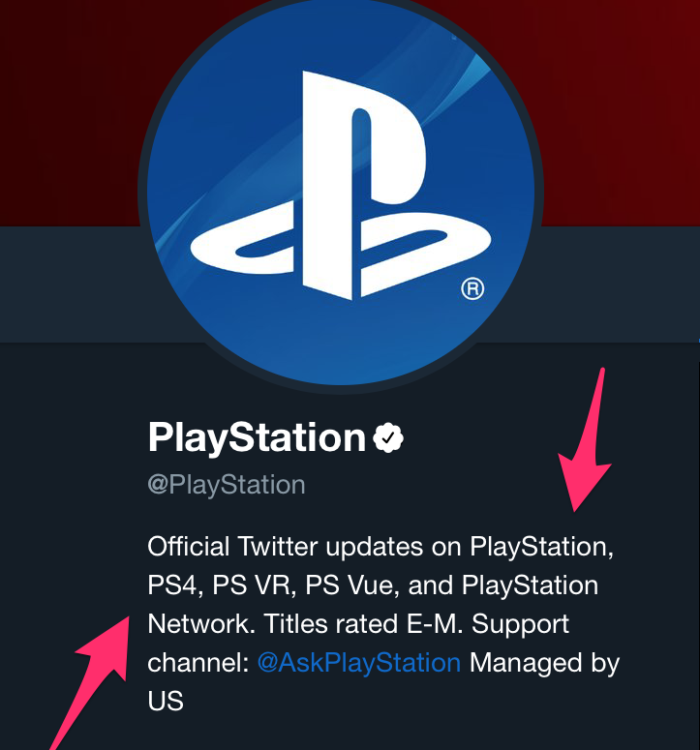
PlayStation’s bio includes common variants of the company’s name as well as their products’ names, such as “PS4” for “PlayStation 4.”
A consumer tech outlet called Gadgets Now uses keywords in the bio, too.
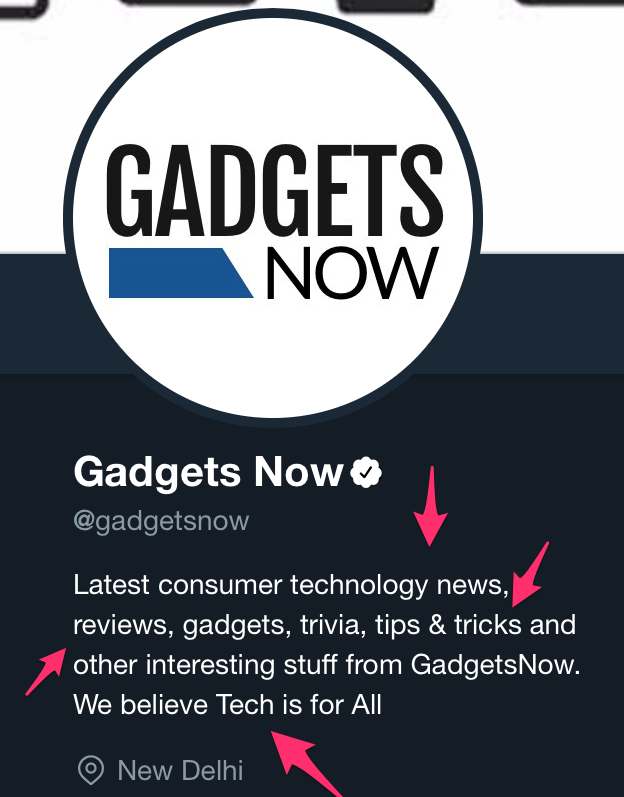
Another element you can include in your Twitter bio is hashtags.
News network CNN incorporates a single hashtag in the bio.
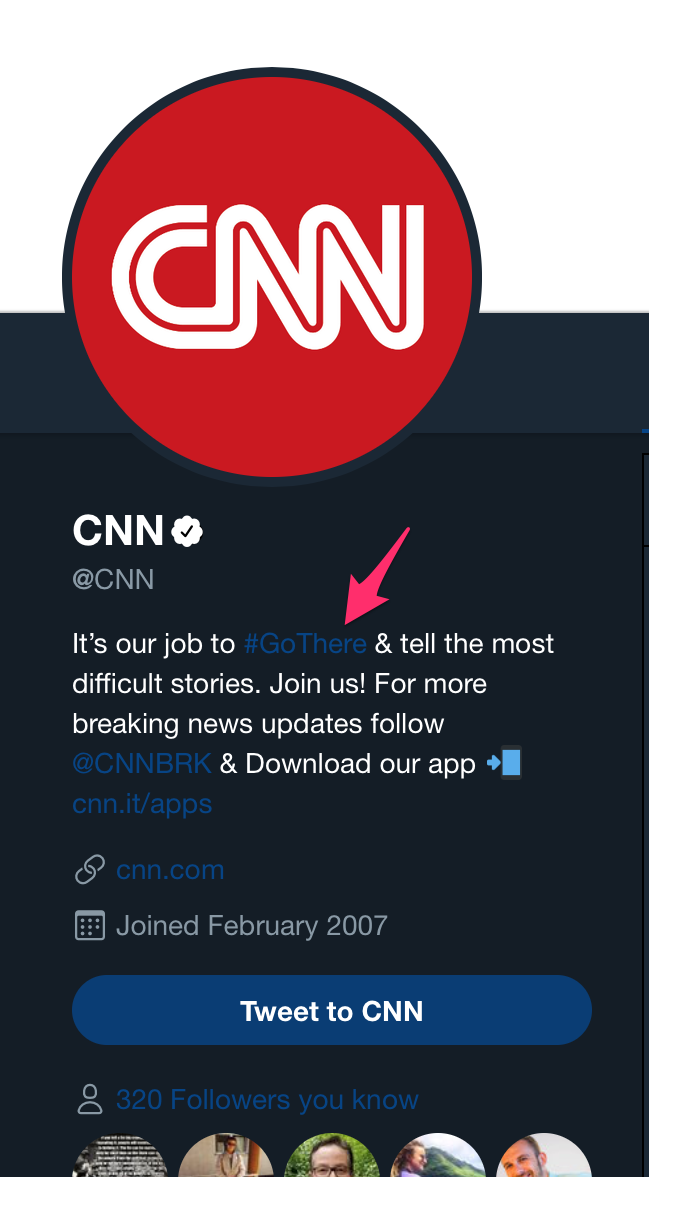
CNN’s hashtag is a great example because “Go There” is the slogan for the network, emphasizing ingenuity and tenacity in journalism.
So the hashtag reinforces the network’s desired brand image.
Your bio can be an opportunity to show some personality, so don’t be afraid to get a little creative.
Content marketer and author Ann Handley’s profile is an excellent example.
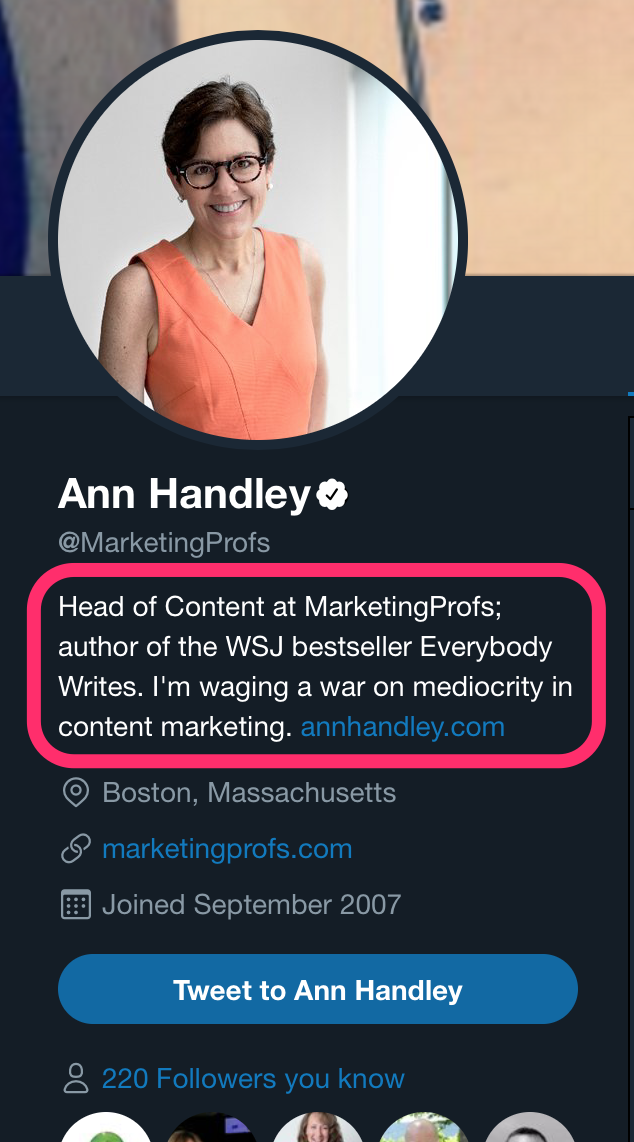
Ann’s use of the phrase “waging a war on mediocrity in content marketing” is accurate and effective while also showcasing her personality.
Once you’ve chosen your profile photo and written your bio, the next step in a great Twitter profile is to find (or even create) your header image.
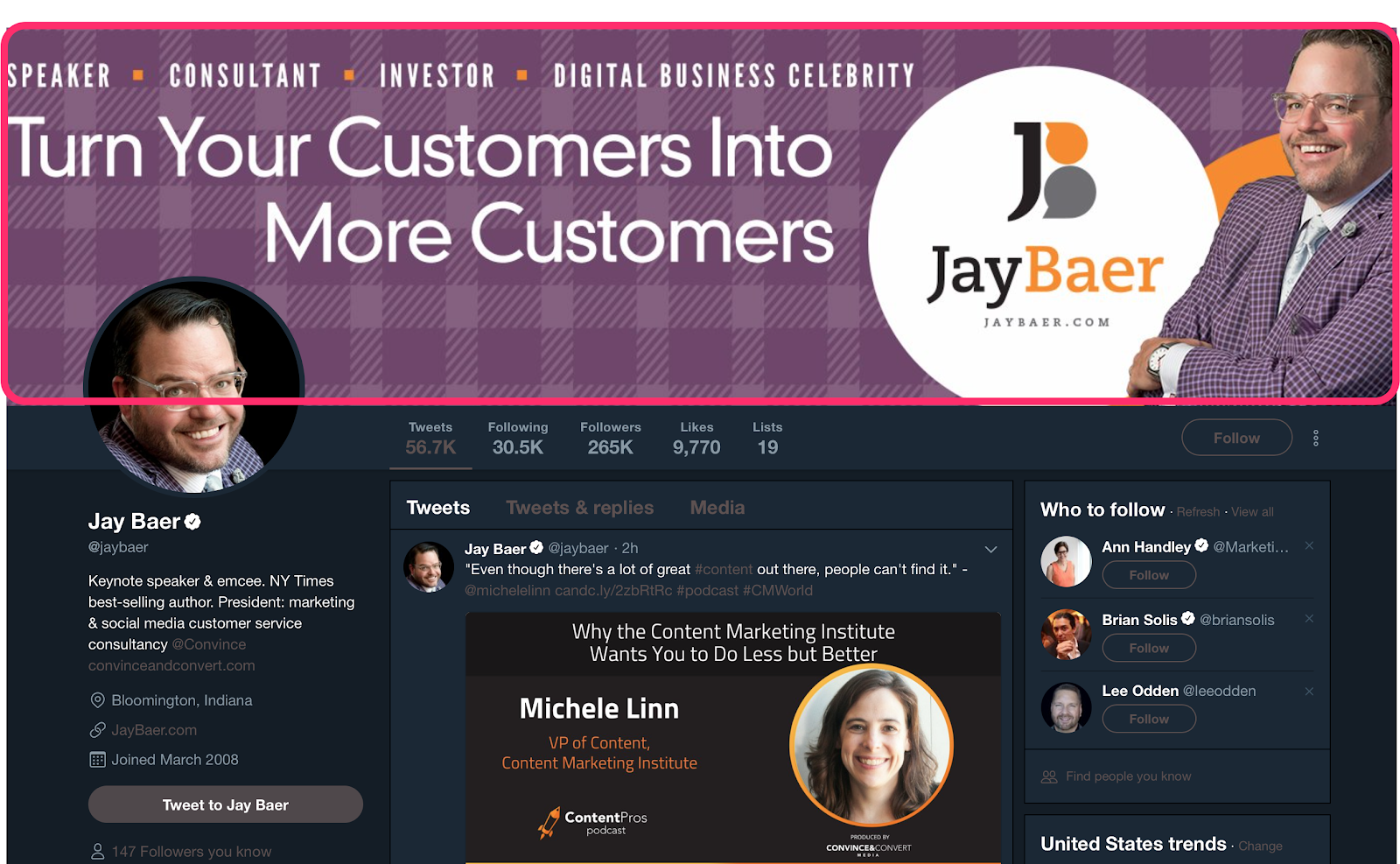
Though it changes from time to time, the current dimensions that your Twitter header image should be are 1500px by 500px.
This can be a great opportunity to reinforce your brand or to promote your latest product or service.
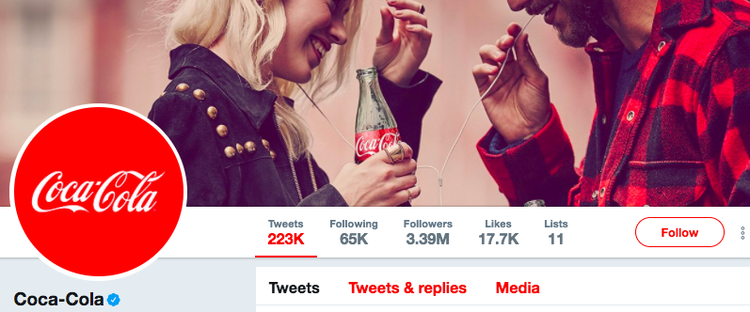
If you have trouble finding the right image with the appropriate dimensions, use a tool like Canva to create your own header image for free online.
Besides being free, Canva also offers tons of templates.
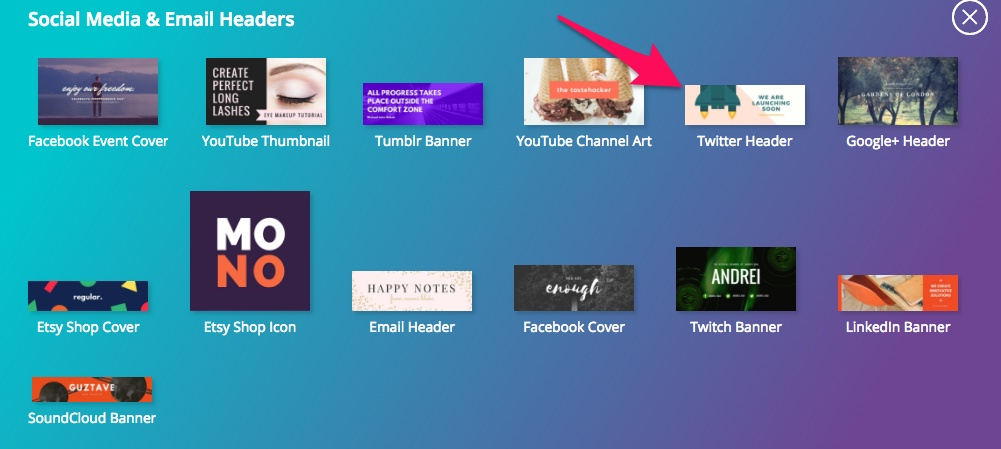
Now that you’ve spent some time ironing it out, your profile will leave a strong impression on visitors who view your profile, making them much more likely to follow you.
2. Engage With Your Twitter Followers
Although your follower count is a convenient metric, many social media marketers have begun putting more stock into engagement than followers.
In fact, Socialbakers account manager Jeraldine Tan actually considers follower growth an outdated metric.
“It is extremely important for brands to stop looking at outdated metrics like fan growth,” Jeraldine said in an article posted on LinkedIn.
“The overall fans number doesn’t matter if the audience isn’t consuming your content.”
So if you have a million Twitter followers but your posts get zero engagement, what are those followers really worth?
Jeraldine’s perspective is reinforced by Incite Group’s State of Corporate Social Media Survey.

According to Incite’s data, there’s no correlation between the number of followers and engagement, meaning that more followers doesn’t mean more engagement.
But when followers interact with and share your content on Twitter, their followers see that engagement and often become curious. The engagement serves almost as an endorsement.
So engagement does lead to increased reach and visibility, which, in turn, yields more followers.
However, interactions your followers are having with your Twitter content isn’t the only type of engagement you should care about.
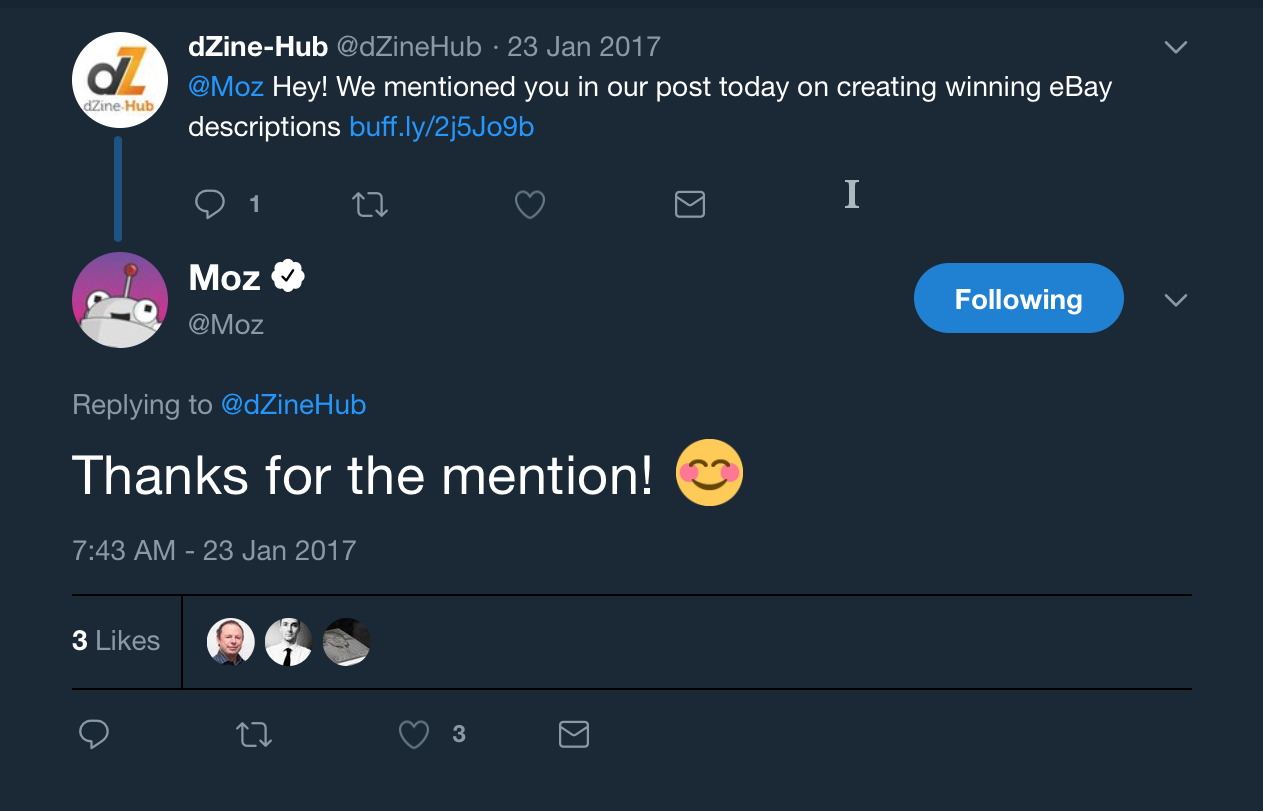
If you really want to grow your Twitter audience, you should be actively engaging back with them.
Responding to the comments and mentions of your followers reinforces their engagement and makes them more inclined to engage with you in the future.
Engaging with your audience yields more tangible results, too.
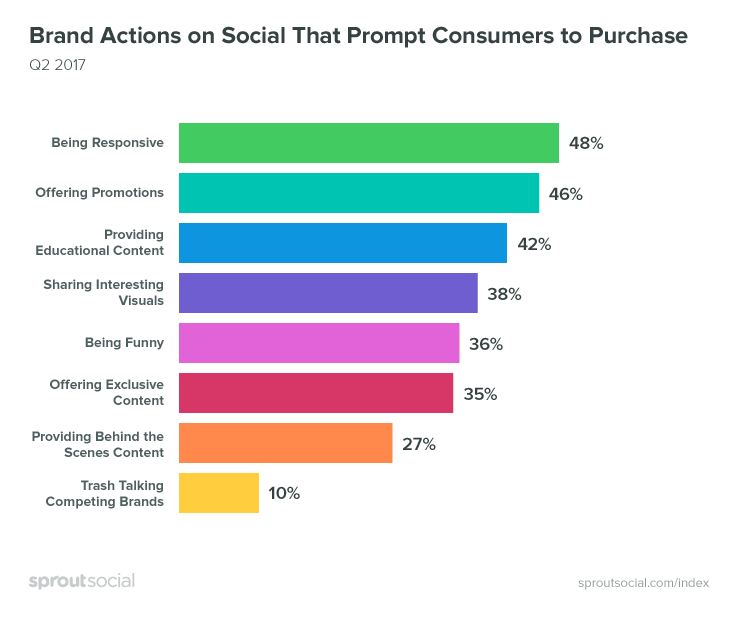
According to data from Sprout Social, 48 percent of social media users cite responsiveness as the top characteristic that prompts audiences to purchase from a brand or company.
Fortunately, engaging with your Twitter audience is easy to do and something you can start doing right away.
There are three main strategies for actively engaging with your audience:
Respond to Comments and Mentions
Responding is certainly the simplest and easiest of these strategies, but it’s also effective.
It’s as simple as this:
When a user tweets to you or comments on one of your tweets, respond.
The acknowledgment will give them a sense of validation.
If you can make the exchange memorable in some way, they may actively seek out your content in the future. So don’t be afraid to show a little personality.
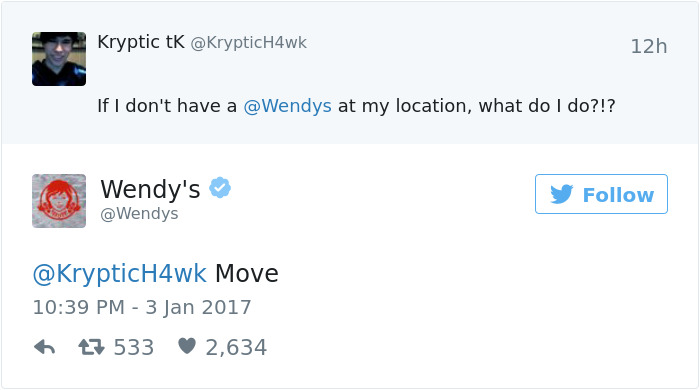
Don’t just respond to other people’s comments — pay attention to your own tags as well. Responses like these build good will and increase your reach on Twitter.
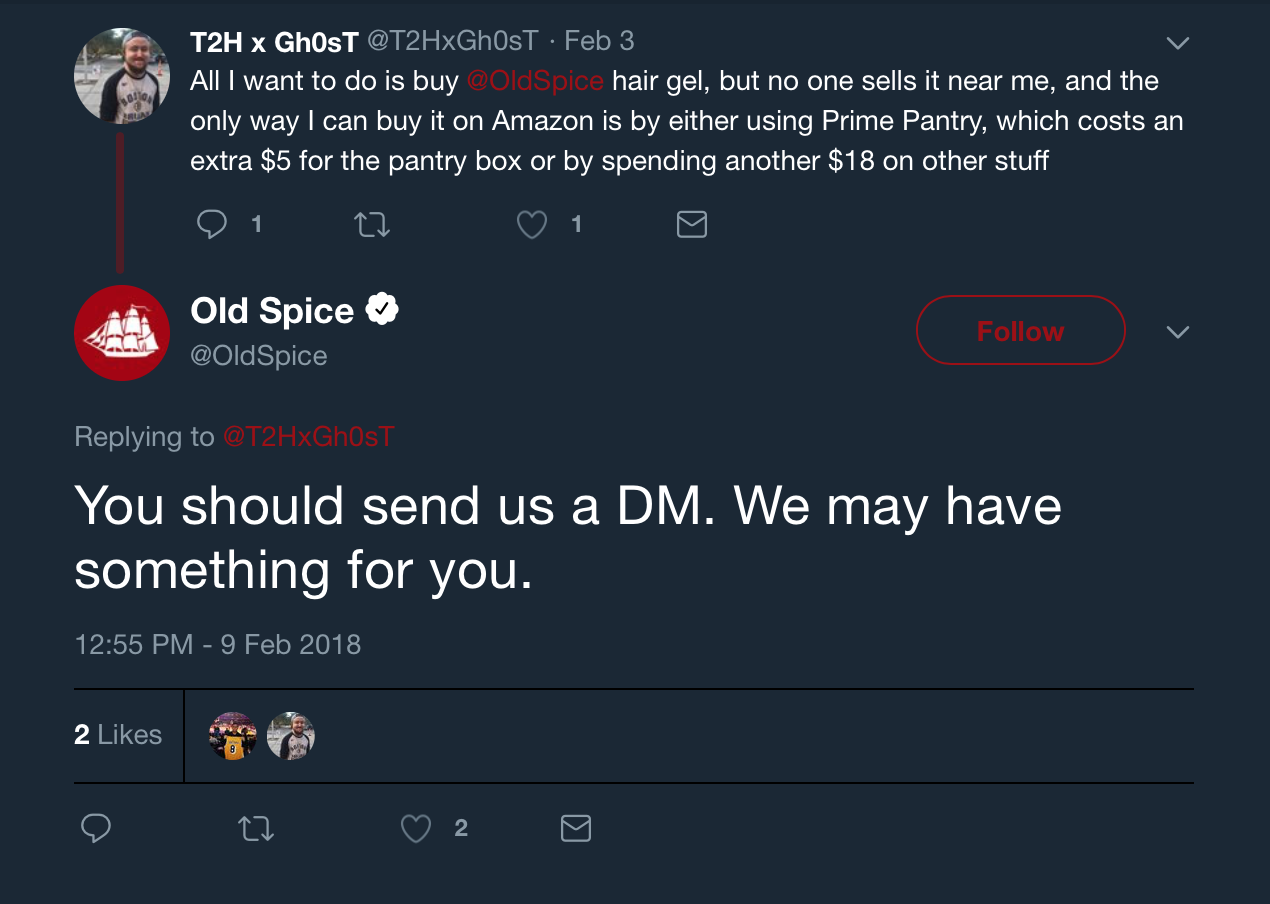
Respond to Direct Messages from Twitter Followers
Take the time to respond to direct messages. Today, customers expect brands to monitor their social platforms.
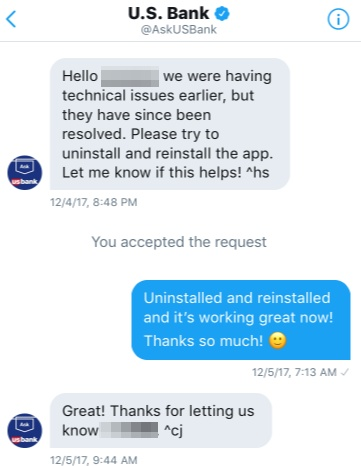
A lot of big brands and companies are finding success with DMs, including 1-800-FLOWERS and T-Mobile.
2. Host or Engage With Twitter Chats to Increase Twitter Followers
Twitter chats are live conversations that use a specific hashtag. They function sort of like a chat room, but are visible to a wider audience due to the use of the hashtag.
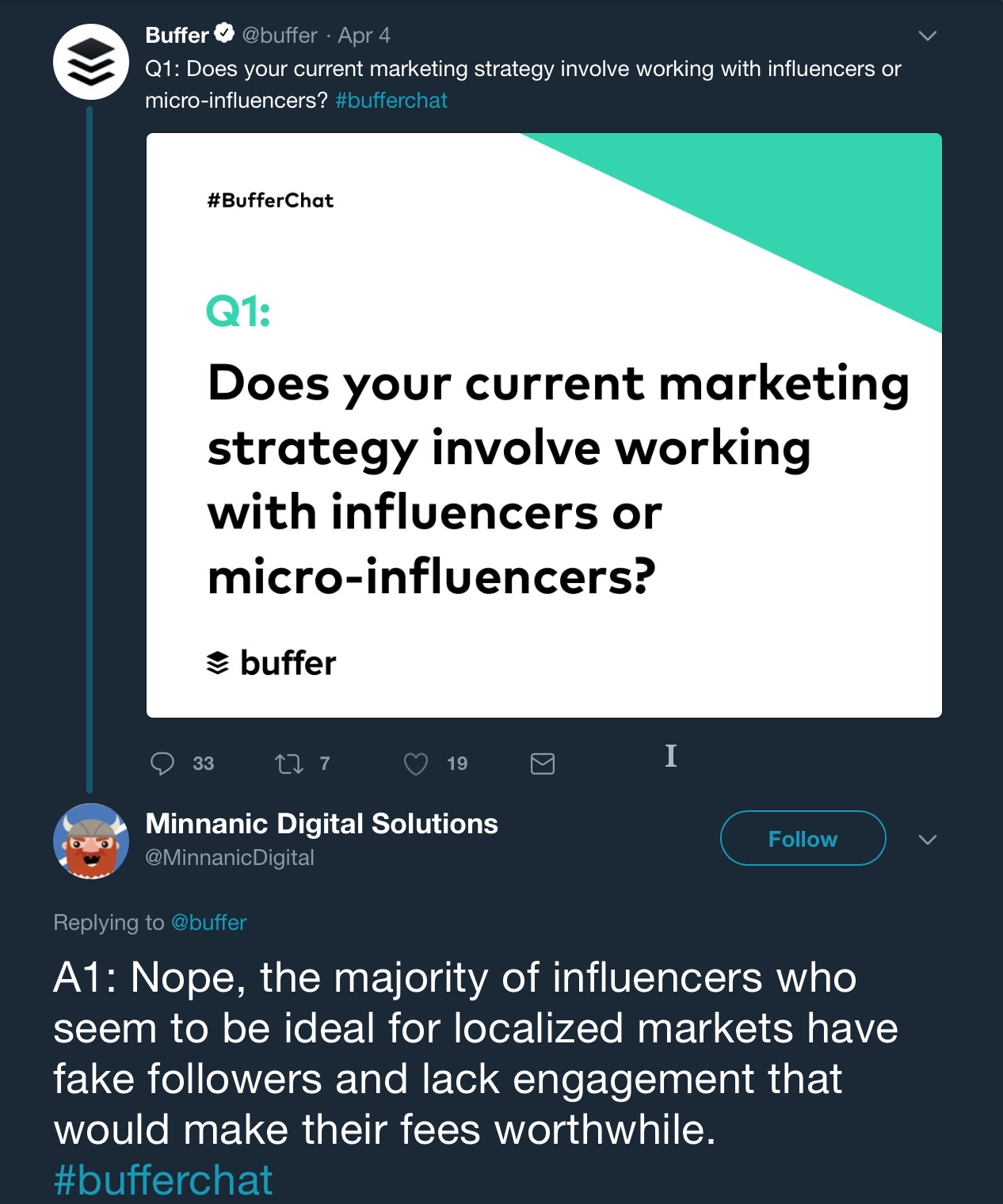
Public relations professional Janet Murray considers live chats an incredibly effective marketing strategy for Twitter.
According to Janet Murray, one way to get even more out of your live chat is to like and retweet other participants’ replies.
“Retweeting the posts of [other users] is a great way to build relationships,” Janet says.
She offers another useful tip: When you’re responding to other participants’ tweets, “don’t forget to use the hashtag so people can follow along.”
Or if you want to tweet someone privately, simply “don’t include the hashtag.”
Buffer — a well-known social media management app — hosts weekly Twitter chat sessions using their own hashtag, “#BufferChat.”

As far as actually hosting the chat, tools like tchat.io and Twchat can turn your hashtag into a more chat-like live stream.
You can access the live Twitter chat directory on Twubs without even needing to register for a free account.

Additionally, you can put your own live chat on Twubs so that others can find it more easily.
Another tip is to either post your questions or ask your followers for some questions ahead of time.
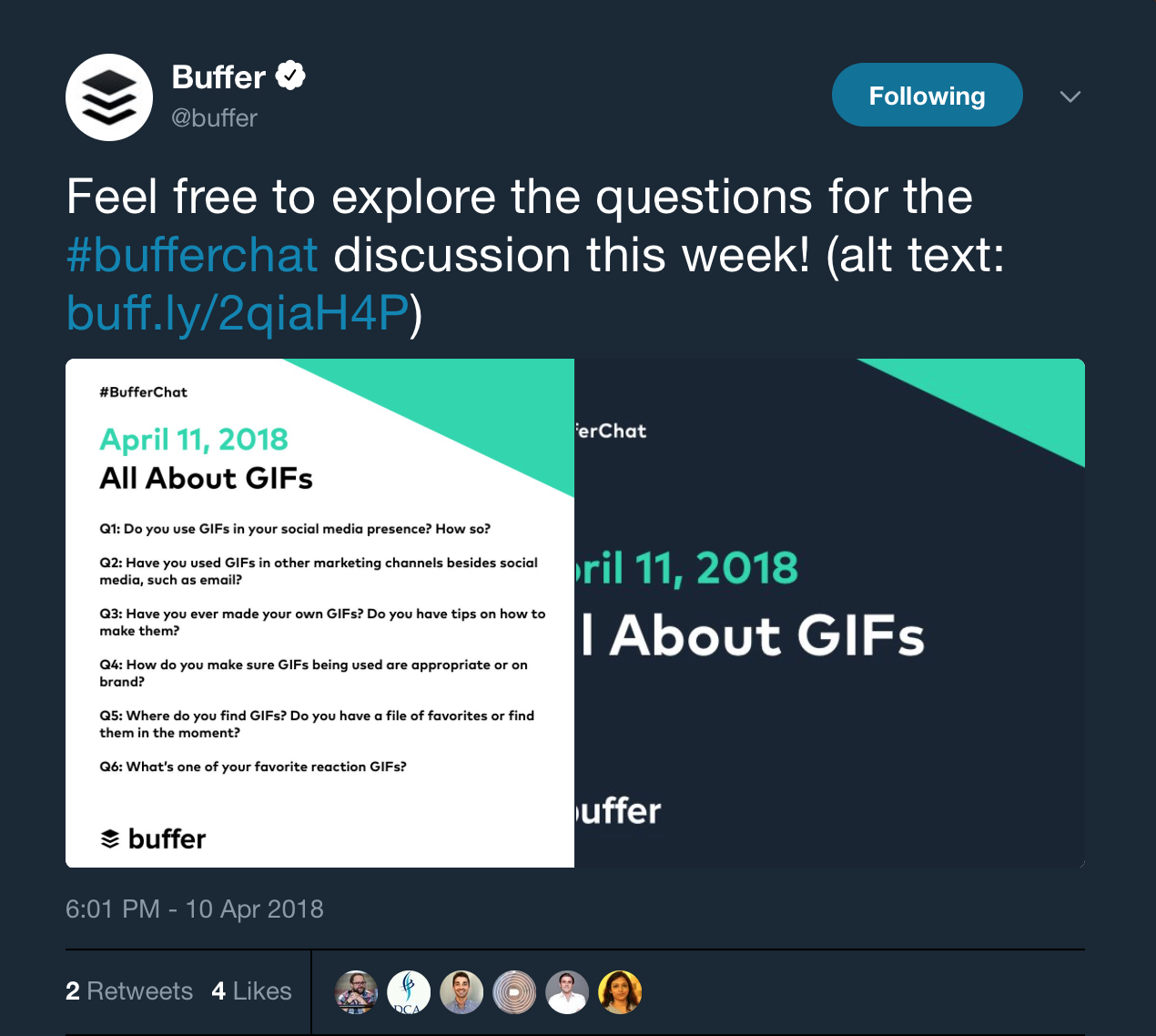
When it comes down to it, actively engaging your audience reinforces the decision to follow you.
Plus, their own followers can see how interactive you are with your audience, which makes a strong impression at large.
3. Stay Active by Creating Daily Twitter Routines
If your goal is to gain followers, I can’t stress enough the importance of staying active.
It’s not enough to post a few times a week or even once per day like you probably do on Facebook.
You could even lose followers if you’re not tweeting regularly.
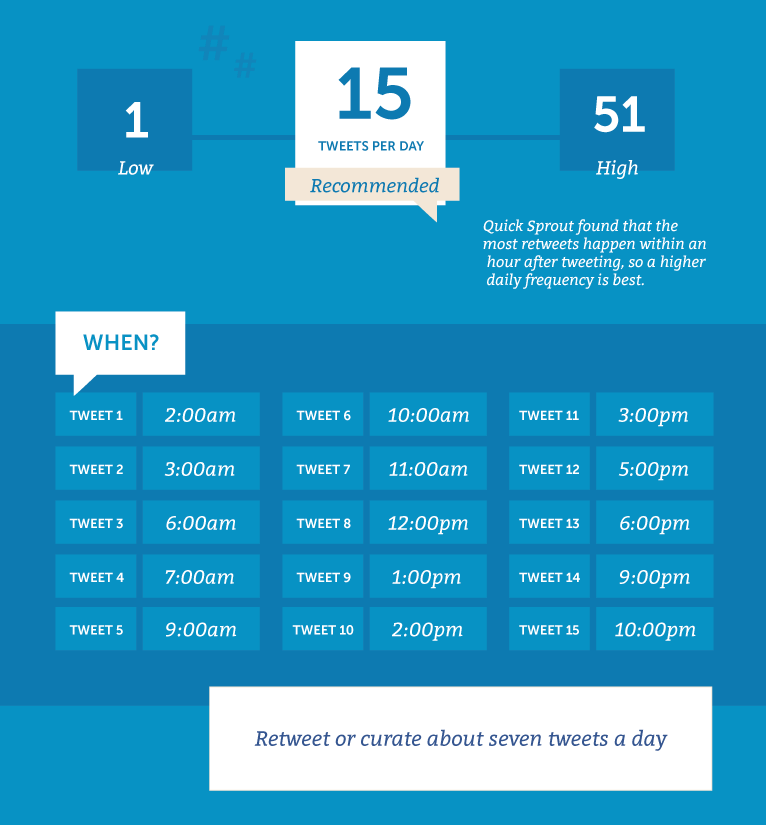
According to CoSchedule, you should post curated content — quotes and retweets — three to seven times per day. Including your own original content, it should be about 15 tweets daily.
Do you have time to sit on Twitter 24 hours per day to make sure you’ve got awesome tweets going out at all the right times? Probabley not.
That’s where your routine can be a life-saver.
The best way to create your Twitter routine is to create separate daily, weekly, and monthly routines.
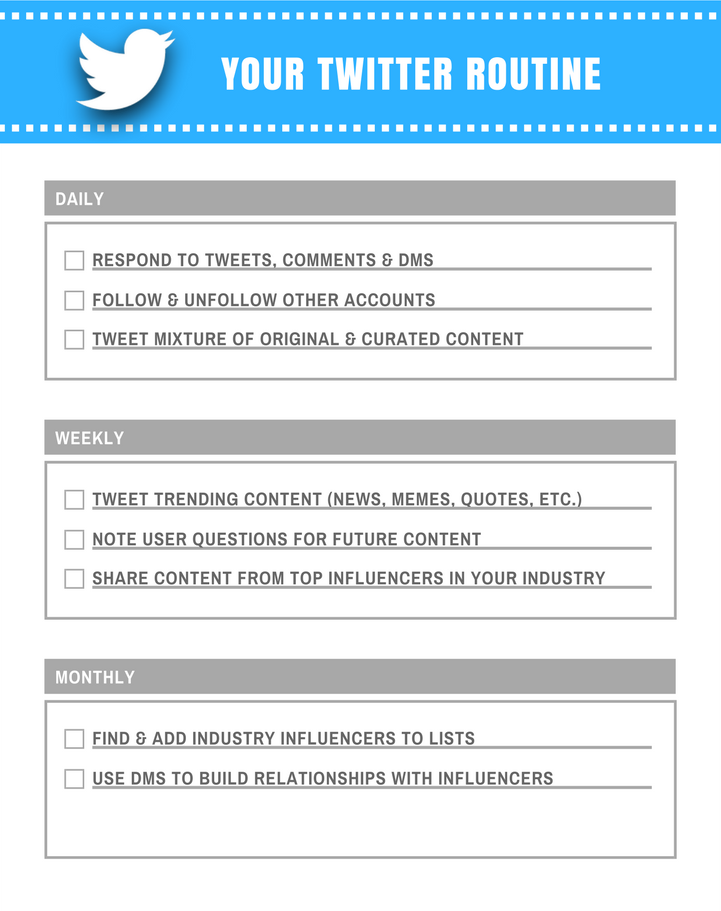
Automate and schedule out your posts in advance with a tool like IFTTT.
Your daily Twitter routine should consist of things like following and unfollowing other users, replying to DMs and mentions, and responding to comments on your tweets.
On a weekly basis, you should focus on broader and more long-term aspects of your marketing strategy.
Your monthly routine should include things that could result in big payoffs down the road.
As such, it largely includes networking with industry influencers, which tends to increase your Twitter reach and visibility.
4. Plan and Schedule Tour Tweets
Compared to a non-chronological network like Facebook, the time of day you post on Twitter matters.
If your tweets are posted when your followers aren’t on the platform, those tweets won’t be seen, and less visibility means less engagement, less traffic, fewer followers.
The logical solution to this problem is to post when the most users are on the platform.
Sprout Social compiled data and found that average global engagement on Twitter is highest on Tuesday between 9 AM and 1 PM, Wednesday between 9 AM and 3 PM, Thursdays between 1 and 11 AM, and Fridays from 9 to 10 AM.
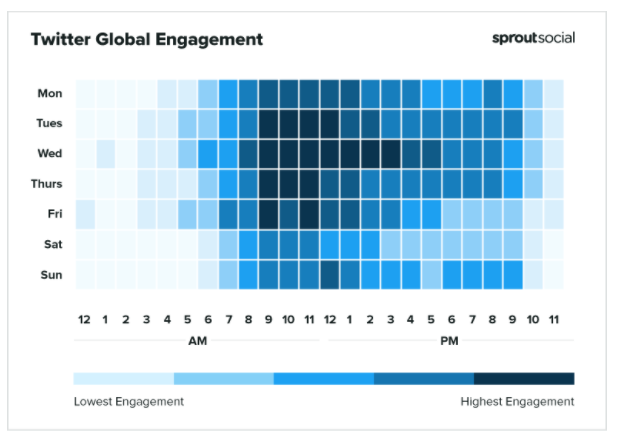
The problem is you’ve got a lot of other tweets to compete with during those times.
That’s where knowing your audience comes in handy.
Different demographic groups have different usage habits when it comes to Twitter.
For instance, there are differences between businesses and consumers.
Twitter content that targets businesses — or B2B content — performs best during business hours.
Content that’s consumer-oriented — or B2C content — performs better on the weekend, according to CoSchedule.
The same study also found that branded content does better overall on Wednesdays.
Branded content like this tweet from Coca-Cola:
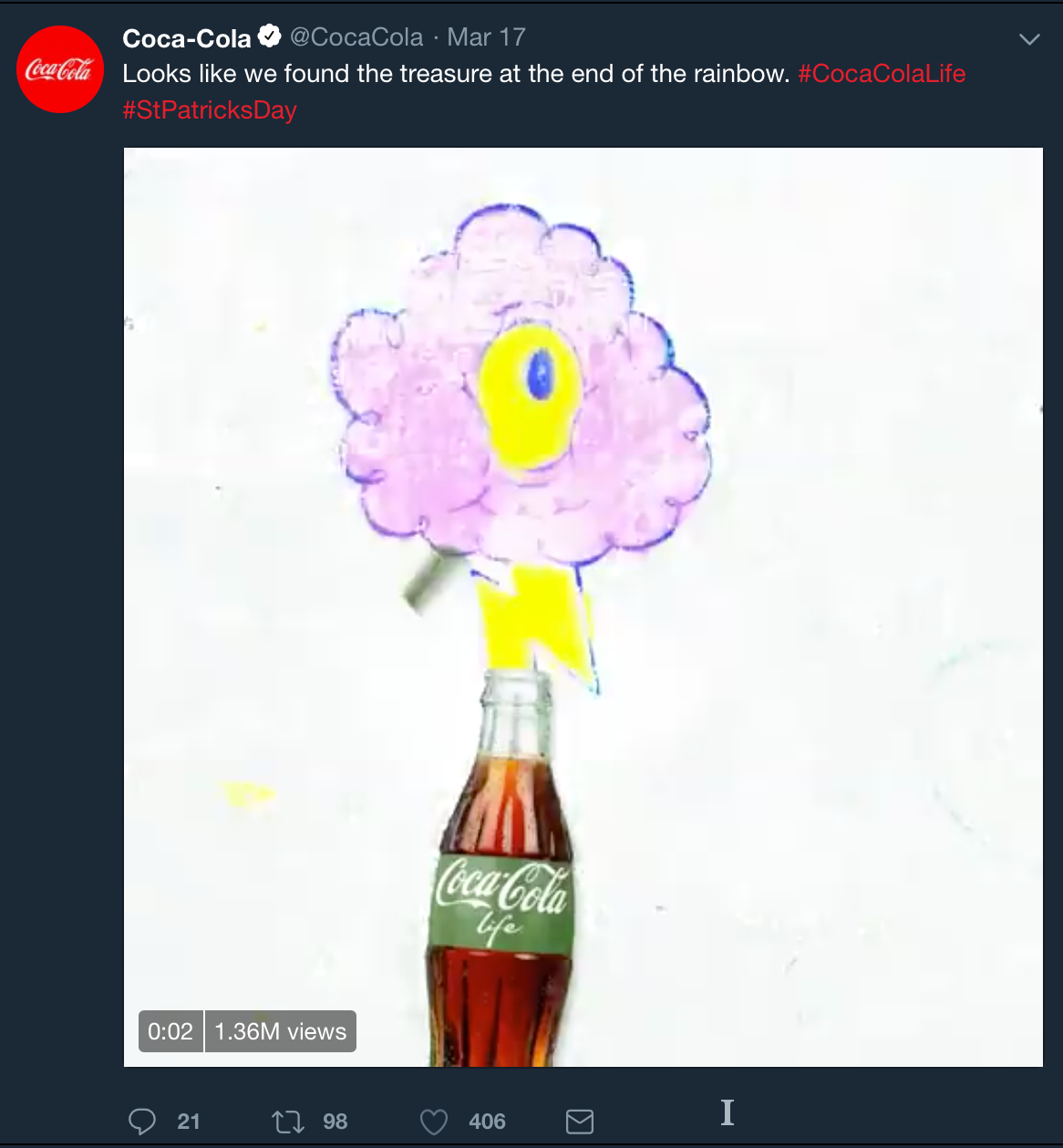
Optimal performance on Twitter means knowing your audience and knowing when you can reach them.
Twitter gives you an audience overview right inside the Twitter platform. With this information, you can tailor your content to your audience’s demographics and interests.
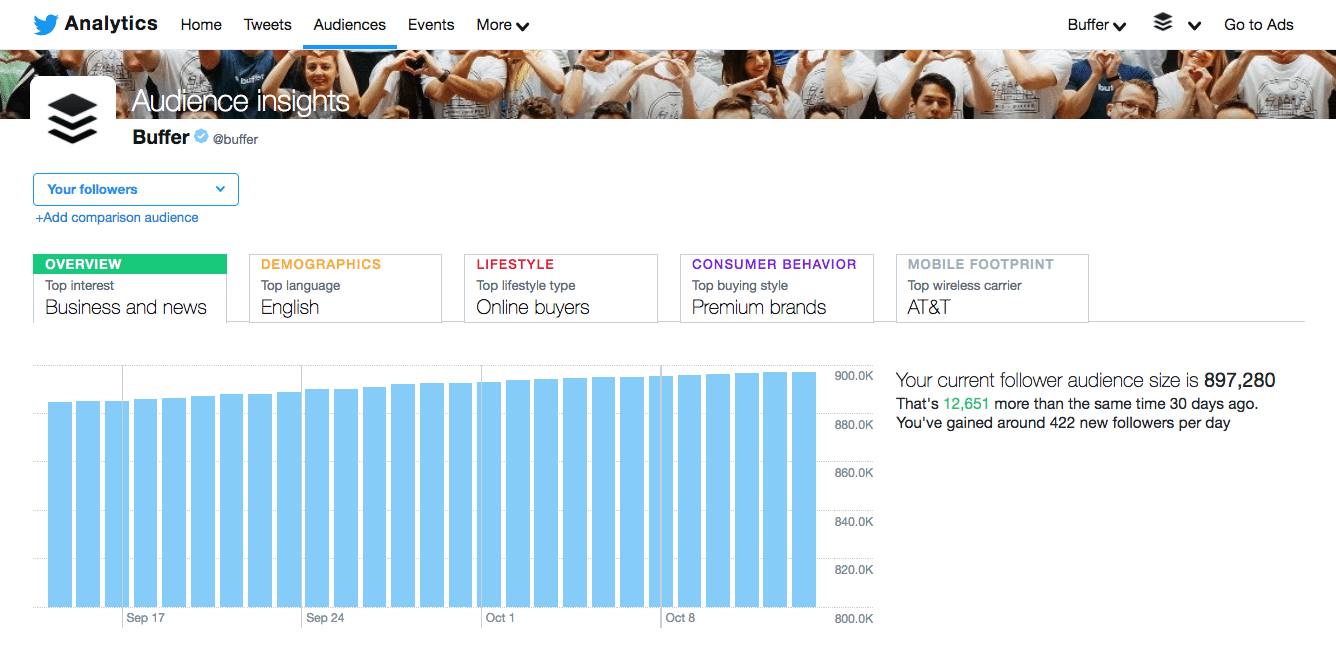
Just go to analytics.twitter.com for information about your audience, including what topics they’re into, what type of consumers they are, and even the wireless carriers they’re using.
With this information, you can choose the best times to tweet to your audience for optimal engagement and reach.
From this point, you can proceed in one of two ways:
You can make sure your daily Twitter routine coincides with your audience’s most active time of day, or you can schedule your tweets to post during that time.
Just know that you need a constant flow of content posting to Twitter, and the best resources to make that happen are readily-available data and possibly a tweet-scheduling app.
5. Make Sure There’s Value in Your Tweets
Twitter marketing is like any other type of marketing in that you’ll experience the greatest success with high-quality content.
With so much competition in most industries, great content helps you stand out from the crowd.
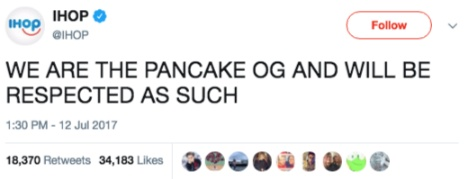
Great content is even more important when you’re trying to build your audience on Twitter.
It’s as simple as this:
Good tweets get likes, comments, shares, and followers. Bad tweets don’t.
So what separates a good tweet from a bad tweet?
Value.
Every time you tweet, you must provide value to your audience.
Because when your content is deemed valuable and relevant, your audience is more likely to connect with your brand.
Isn’t value subjective?
Yes, but only to the extent that what’s considered the most ‘valuable’ can vary from one person and demographic to the next.
It’s no lie that people tend to prefer content that’s informative or educational.
This can include an infographic, how-to article, or even current events coverage.
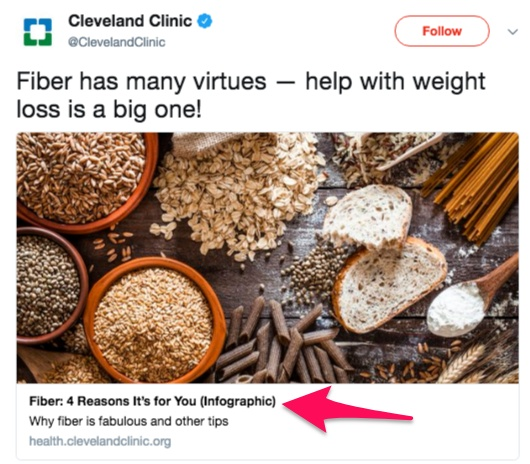
Others put more value on entertainment.
This can include things like memes, gifs, funny videos, or even the actual entertainment industry.

Then there are those who want to be inspired.
Inspirational content largely equates to popular quotes as well as inspirational true stories (weight loss, rescued animals, etc.).

Don’t forget interactive content.
Interactive content refers to things like polls, quizzes, web browser-based games, etc.
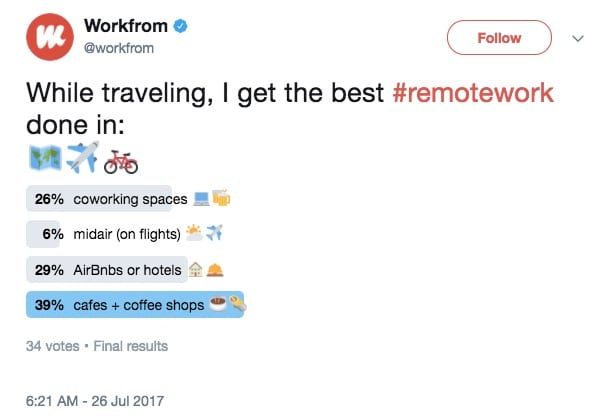
Another common type of content on Twitter is promotional.
Typically, promotional content consists of advertisements, coupons, customer testimonials, etc.

Each of these types of content represents a particular perspective in regards to value.
When people find value in your tweet, it gets more engagement. That’s just the way it works.
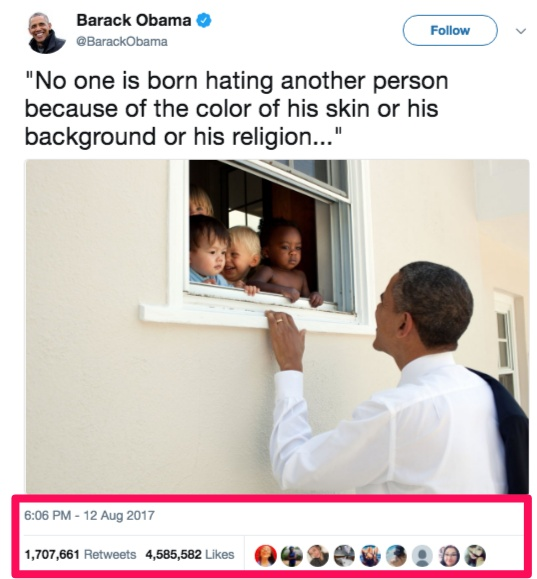
Of course, this is another reason why knowing your audience is important.
You gain a better sense of what they find valuable and can personalize your content accordingly.
6. Pick the Right Tweet to Pin to Your Profile
Pinning a tweet is like putting a spotlight on that tweet, calling the attention of anyone who visits your Twitter profile.
There are a couple of ways you can approach choosing the right tweet to pin to your profile.
The first strategy is to pin a tweet that has performed particularly well.
If it gained lots of attention from your followers when you initially posted it, the tweet will probably appeal to others who are visiting your profile.
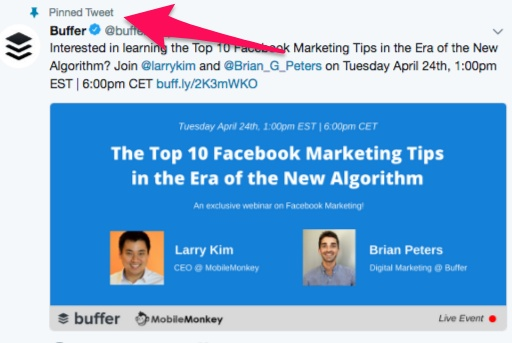
It will certainly get more views and is likely to get more likes, comments, and shares as well.
Since new tweets push older tweets further down in your timeline, your newer followers are unlikely to ever see your best ones.
Pinning a tweet that was well-received by your followers will ensure that profile visitors and potential followers get to see it, too.
It’s also common to pin a tweet that highlights a temporary promotion or an upcoming event that your business is involved with.
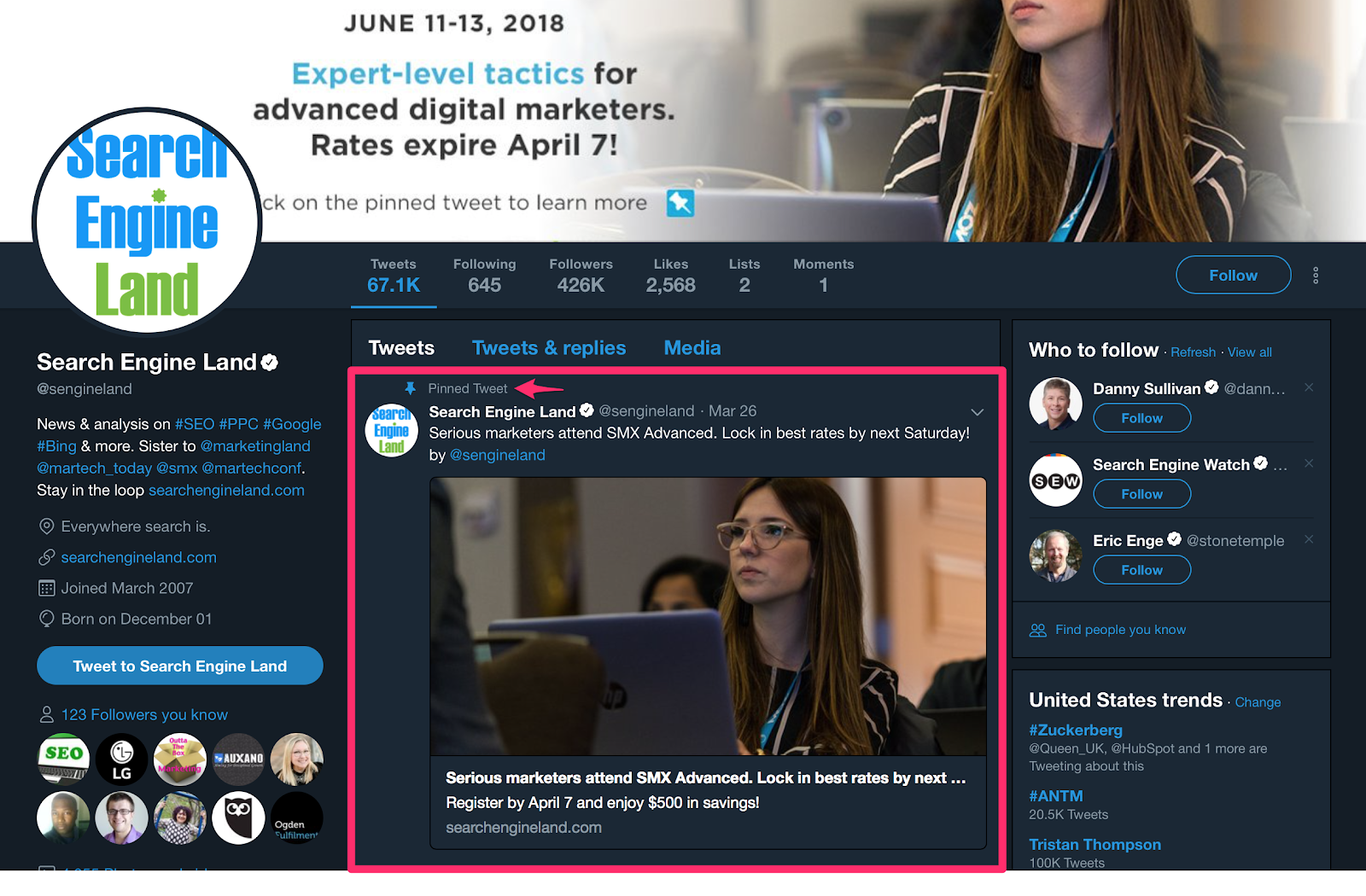
When the promotion or event is over, you simply unpin the tweet and pin a new tweet for your next one.
Another strategy for choosing the right tweet to pin is to pick a tweet that promotes your business or brand.
For example, if you tweeted a link to an interview you participated in.
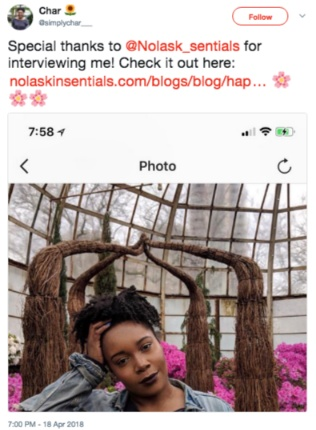
In effect, it’s actually someone else’s promotion of your brand or business, but you’re pinning it to highlight the value that others have placed on what your brand offers.
Much like a job interview or a business pitch, a pinned tweet gives you a small opening to make a big impression.
7. Link to your Twitter Account on Your Website and Other Social Media Profiles
It may seem counterproductive to be diverting traffic from your website to your Twitter profile.
After all, don’t you want traffic going to your website so they can make a purchase?
But surveys show your social media profiles are just as effective for content marketing as your own website.
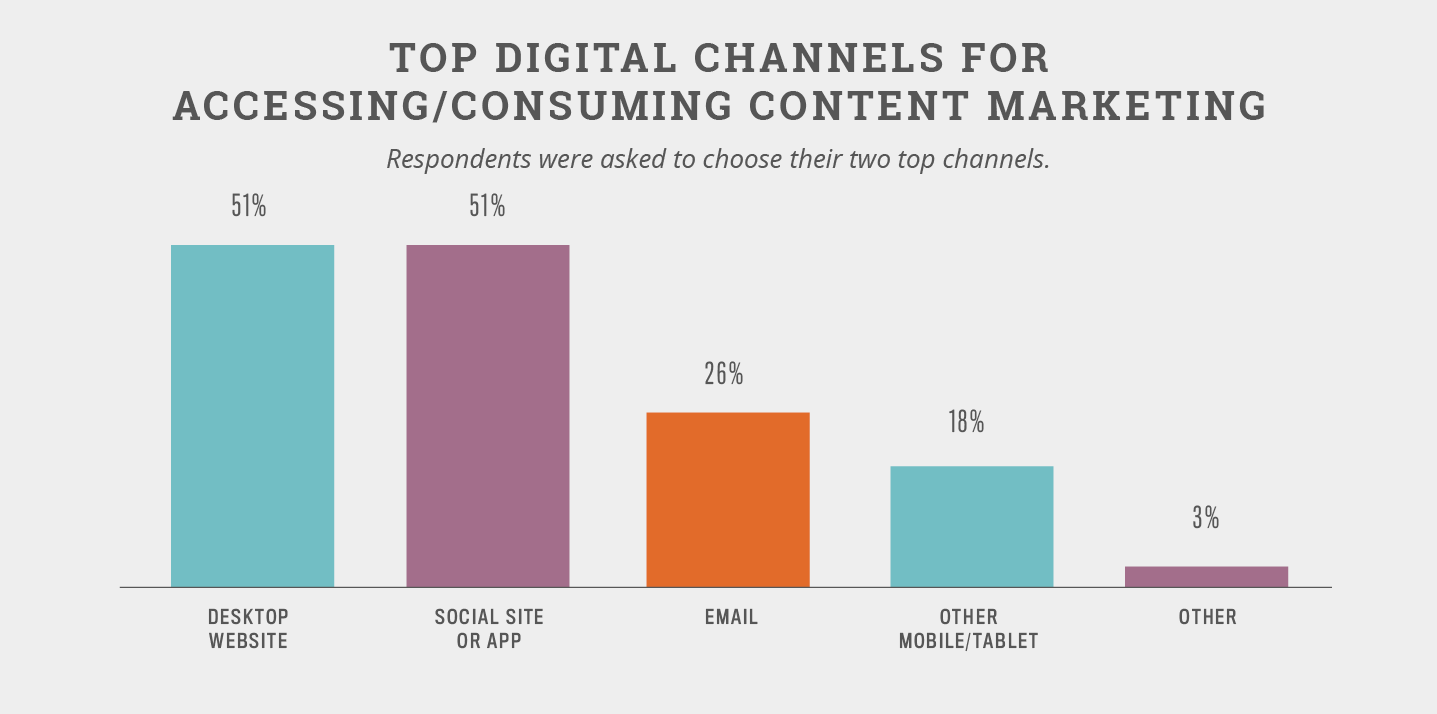
This makes a lot of sense.
So to a large degree, sending traffic to your website actually gives you more opportunities for conversion.
Of course, you don’t want to simply drop a raw link into the body of your website.
Instead, you should link to your Twitter profile in a way that’s a bit more professional.
It could be as simple as attaching the link to an icon.

If you want something a little fancier, you could even link to your Twitter profile by embedding a tweet into your website or blog:
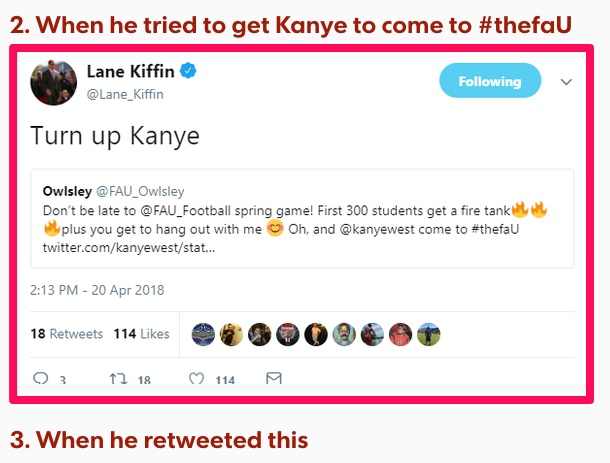
Simply go to publish.twitter.com where you’ll find options to embed a grid, tweet, timeline, or a button.
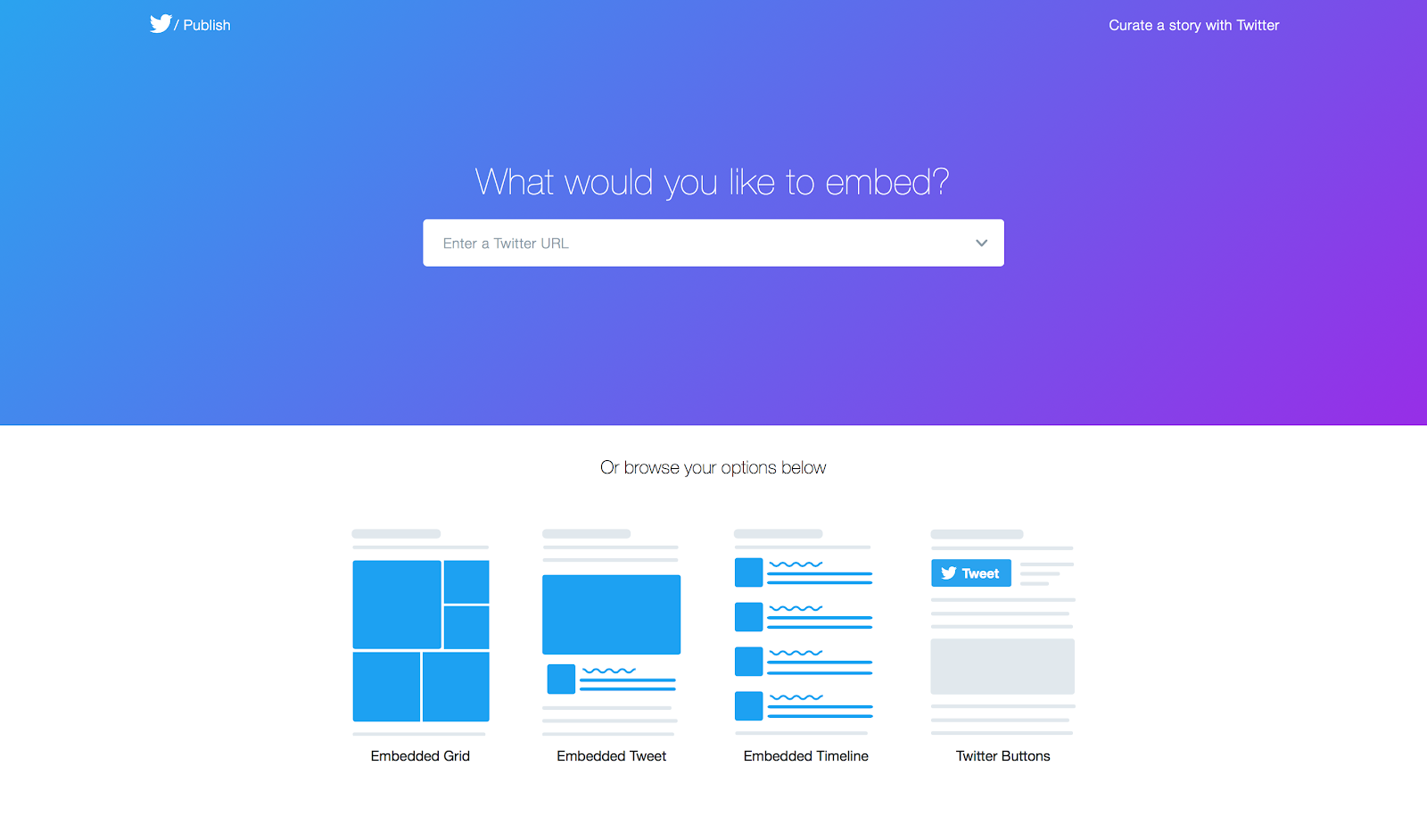
All you need to do is copy the link you want to use and paste it into the prompt at the top of the page.
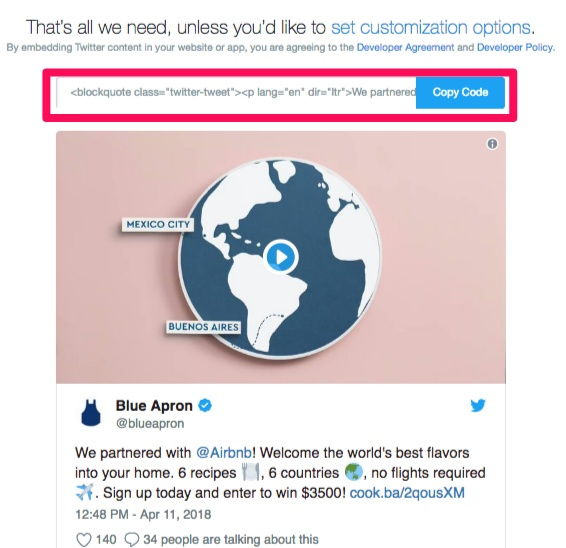
Similarly, you should link to your Twitter profile on other social media.
For example, Facebook gives you the option to include your Twitter username in a specific section of the ‘About’ section on your Page.

It gives any of your Facebook followers who also happen to use Twitter the ability to access your Twitter profile easily.
Because if you have people following you on other social networks, there’s a good chance that any of them using Twitter would want to follow you on that platform, too.
Gain Twitter Followers FAQs
What does my Twitter profile need to increase followers?
Make sure all available fields are completed, like your URL, name, and bio. Include applicable keywords or hashtags in your bio to get found by people searching.
How can I engage with my Twitter followers?
Engagement leads to increased reach and visibility, so be sure to answer mention tweets, participate in Twitter chats, and reply to tweets from accounts you follow.
How often should I tweet to increase Twitter followers?
Many studies recommend tweeting 5-15 times per day.
What should I tweet about?
Make sure your tweets offer value to your audience, either through knowledge, humor, customer support, and answering questions.
How to Get 10,000 Twitter Followers Conclusion
Twitter is an international platform with millions of users. It’s just as valuable (if not more valuable) for racking up an audience than sites like Instagram or Facebook.
Getting as many as 10,000 Twitter followers doesn’t have to be hard.
First, you need to optimize your profile. Add a high-quality profile picture, since it’s the first thing people will see when they come across your brand on Twitter.
Complete your bio and don’t forget a header image, too.
Start engaging with your followers by responding to comments, mentions, direct messages, and live chats.
Create a Twitter routine you can stick to. If you aren’t active, your engagement will dip. Make a daily, weekly, or monthly Twitter schedule.
Make sure that what you’re sharing is valuable. Share interactive content, like a poll, quiz, or infographic for best results.
Pin a relevant tweet to your profile. If you have an ongoing promotion or upcoming event, tweet about it and pin it to the top of your page.
Finally, be sure to link your Twitter account to your website and on your other social profiles for maximum exposure.
Each of these steps will result in substantial growth but put them together, and you are likely to see some pretty phenomenal gains.
What are your favorite Twitter follower growth hacks?
How to Get More Twitter Followers Fast (7 Easy Steps)
Publicado Primeiro em Neil Patel
Nenhum comentário:
Postar um comentário